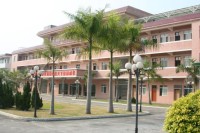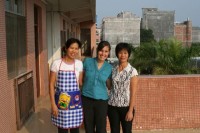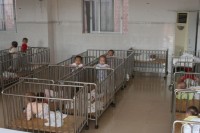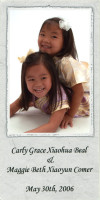Sat 20 Oct 2007
In Honor of Maggie and Carly
Posted by Shanna under China, Community Service
[16] Comments
If Derek and I weren’t going to be on the road for the next eleven months, I’d say there’s a fair chance that, sometime during the last four days, we would have adopted a Chinese daughter. We’ve just returned to Guangzhou from the Social Welfare Institute of Yangxi, an orphanage in the southeastern part of China.  I’m not sure that we’ve digested everything that happened during our time there, but perhaps we never will.
We found the Institute through Mindy Sontag, a dear friend in Nashville whose niece Maggie was adopted from there four years ago. When Mindy learned that we wanted to do some volunteer work during our time in China, she asked if we would be interested in stopping by. We responded in the affirmative, and she and her family, along with Derek’s parents and the parents of another little girl – Carly – who was adopted from the same place, offered up a very generous amount of money for us to use to purchase whatever the orphanage needed. (We’ve posted a picture of Maggie and Carly below).

We arrived in Yangxi on Wednesday with pockets full of Chinese yuan. We literally showed up on the orphanage doorstep and–with much gesturing and thumbing through our very cursory Chinese phrasebook–announced “we’ve come bearing gifts…let’s go shopping.”  And so we piled into a minivan with a bunch of the Institute’s higher-ups. In a prelude to the incredible hospitality that the staff would show us over the next few days, our first stop was a hotel, where the orphanage director negotiated a rate for us that was 1/5 of the one posted.  Then we were off to the market, where the staff selected a bouncy chair, a blender, 200 baby bottles and some plastic baskets. Our next stop was an appliance store, where a washing machine and a bottle sterilizer were purchased in rapid measure. Later, the director placed an order for 90 onesies (for those of you without kids, that’s a kind of baby clothing…), which should arrive next week. We found ourselves wishing that Mindy and family were there to witness the shopping spree.
Having obtained permission to volunteer atthe orphanage for a couple of days, we arrived on Thursday morning and spent a couple of hours folding what must have been thousands of cloth diapers. And then we got to meet the babies. Here’s the part we haven’t digested yet.

In our estimation, the Institute houses about 60 babies, 58 of whom are girls. (The remaining two are boys who appeared to be mentally and physically challenged.) This incredible gender disparity is a product of China’s one-child policy. Adopted in 1979 with the goal of limiting population growth, this policy restricts all urban Chinese families to one child apiece. Rural families are allotted two children, and the eight percent of the population who qualify as minorities are exempt from the policy altogether. Traditional thought values boys over girls, and so families with a limited number of opportunities to try for a boy sometimes abandon newborn girls. For obvious reasons, I really struggled with this.
Because I’m entirely unfamiliar with orphanages in general and Chinese methods of child-rearing in particular, I’m finding it very difficult to write an objective report of the babies’ living conditions. It seems that their basic needs are being met. The appear to be well-fed. Their diapers and their clothes are changed on a regular basis. The institute is clean. I’m not sure how much more one could legitimately expect.

With that said, the babies spent the great bulk of their time in small cribs made of metal bars and rough, wooden planks. (Yes, they sleep on wood.) They often have only a towel for a blanket.  We saw a lot of open sores and runny noses. We saw no mobiles, no stuffed animals, no books. We saw neither soap nor baby wipes. My heart ached every time I entered the rooms where the babies lived, and I found myself wanting to hold each one long enough to instill in her the memory of being touched. It was not easy, and we left with heavy hearts. We also left on a mission to purchases a mattress for each crib.

Wensi, a kind woman here in Guangzhou who works at this area’s umbrella adoption agency and speaks fluent English (hooray!) gave up her Saturday today to help us with this task. All day today, our Chinese guardian angel helped us to navigate this city’s busy streets and its many baby supply stores. She also helped us to understand a lot of what we’d seen at the orphanage. For instance, she explained that many Chinese babies sleep on wooden boards because their parents believe that it promotes bone growth. She also assured us that all of the orphanage’s healthy babies eventually get adopted (not so for the not-so-healthy ones; they often remain institutionalized). Her agency processed 2,200 adoptions last year alone. Wensi told us that most Chinese people endorse the one-child policy as a way to prevent food shortages and other pitfalls of over-population. We left her with a better understanding of how the American lens through which we view the world perhaps made a difficult situation appear even more dire than it actually was. The perspective she offered was invaluable.
We’re meeting Wensi and her daughter in the morning to discuss over a dim sum brunch the mechanics of procuring crib mattresses (not American-style thick, but with a Chinese-acceptable level of padding) from a nearby factory. We can only hope that, someday, she’ll visit us in the US so that we can try to repay the incredible kindness that she’s shown us.
I cried while reading this post. Bless you (and Mindy’s family) for everything that you were able to do. I can only imagine what a happy surprise it must have been for the orphanage to have you both show up on their steps. I can honestly say that I would have had an unbelievable time leaving without one of those beautiful little girls. I can’t imagine how hard it must have been, though I suppose there is consolation in the fact that you have so many more people to help. What an amazing, amazing journey.
I can’t believe that the babies are treated like that. A friend just gave birth to a wonderful baby who is totally spoiled with everything. It is sad and I feel sorry that their parents can’t take care of them the way we do.
I am mom to Carly Grace, the little girl adopted with Maggie. I am overwhelmed with emotion for the gift you have just given us. In holding and rocking the little ones at Yangxi, you have held and rocked my little girl when I could not…words fail to express my hearts response in reading what you have done. Thank you, Sharyn
I am really enjoying reading your postings. This one truly touched my heart. I would love to help with the matresses purchases, so let me know how I can help.
you guys are doing Gods work and even though you are on an adventure you have the ability to touch many lives internationaly….this is indeed whst God intended for us all to do in our journey..thank you both for sharing your time and love with many less fortunate folks…you are blessed to have each other and we are blessed to be able to share your stories…i want to thank you for all you do and also mike misses the hell out of you guys…thank you again and especially for visiting Maggies home town..blessings to you both debbie and doc
This has also brought tears to my eyes. I wonder if they knew they were opening their doors to angels that day. What you have done is absolutely incredible! I hope that you have inspired others to Volunteer in their hometown, whether it is with children, the elderly, animals, or the environment, there is a cause for everyone.
This post is the most emotional and heartfelt entry yet.I get to work and do what I have to do and then pull up ONE YEAR ON EARTH. I couldn’t stop crying…I felt so many emotions..Bless the both of you.
Derek and Shanna,
As I sit here trying to find the the appropriate words to say THANK YOU, tears continue to fall down my cheeks. I am in awe of you both and your willingness to work in Maggie’s and Carly’s orphanage. In James 1:27 we are told to look after orphans and widows in their distress, and that is exactly what you both have done. You have both given of yourselves, expecting nothing in return. That is truly what it means to serve. I will be eternally greatful to you both for all that you have given to Yangxi, your time, your money and your hearts. I am amazed at what God has done through you both on the other side of the world. He was able to orchestrate this entire event. I have to continue to remind myself as it says in Luke 1:37 For nothing is impossible with God. I AM TRULY BLESSED TO BE MAGGIE’S MOTHER. SOMEHOW SOME WAY GOD PLANTED THE SEED OF ADOPTION IN MY HEART AND THEIR MY LITTLE GIRL GREW UNTIL I WAS ABLE TO TRAVEL TO CHINA TO GET MY GIFT FROM GOD!!!! THANK YOU AND MAY GOD BLESS YOU BOTH!!!!!!!!!!! LOVE AND PRAYERS! LeAnne Comer
Thank you for your generosity, we are overwhelmed!
Derek and Shanna,
Your journey has been amazing and your website is incredible with all the right details. The elequent description of places, the humor with new experiences, and the pictures are truely awesome. I am made to feel as though I am actually there with you, instead of back here in good ole Nashville.
Of all the posts to date, this one touched me most. I had heard of the rate of abandonment of newborn girls in China – and to know they received your help was a small comfort. If you ever decide to take up a collection, please let me know.
Lastly, having worked with Dereks father many years I must say that I have always respected Doug but now I am in total awe of his son and new wife!
Keep posting your journey and we will all keep reading and wishing we were right there with you.
Blessings to you, where ever you are today. I was just looking around for information about Yangxi and the current snow storms and I found your post. My daughter is also from Yangxi, adopted in 2006. You have done great things for those children. I think of those children often. In fact, some dear friends of mine also have a child from Yangxi who was adopted just one month after you were there. You most likely saw her on your vist! 🙂
Peace.
Tracy
Thanks so much for sharing your blog…we also have a daughter from Yangxi and reading your post brings tears to my eyes for the waiting babies there. What a wonderful thing you have done by spending time with these little ones and all that you have brought to Yangxi to help with their care. Our daughter was placed into our arms in October of 05 and to this day I still search for someone who may have held her or seen her on their visit…a picture would be amazing to me. Thank you again:)
Janice
Thank you for visiting Yangxi SWI.
My name is Megan Montieth and my husband Greg and I are in the process of adopting one of those baby girls that you hopefully held. Our daughter’s name is Yang Xi Zi Ye (we have named her Sophia Grace) and she will turn 16 months old next week, she is one of the Special Needs children at Yangxi SWI.
We hope to bring her home with in the next 6 months. While we wait it was truly a blessing to see your photos posted and while I did not see Sophie’s face, perhaps hers was one of the back of the heads?! ; ) You are angels and may God bless you.
Sincerely,
The Montieth family
Megan-Greg & Big Sister Emma (Yangdong SWI)
Congratulations on your wonderful trip. We adopted a baby girl from the Yangxi Social Welfare Institute last August, her name is Zi Wan (which means Purple Grace). We were lucky enough to visit the orphanage you describe, and were all very surprised by the lack of mattresses. I hope you were successful in purchasing something for our little one’s to lay their heads on.
Believe me, our little girls crave human contact, it’s wonderful you were able to hold them for awhile. I think we should supply some rocking chairs next.
Best Wishes,
Rosemary Thompson
Ottawa, Canada
What a wonderful journey you are on! Found your site through a friend. We have a daughter from China (Hubei province) and spent a week in Guangzhou. What a wonderful gift you gave those children both in necessities and in love. We are currently waiting for our second daughter from Vietnam….are y’all going there ??
Thank you for your loving, generous spirit.